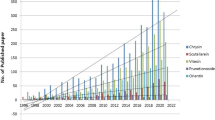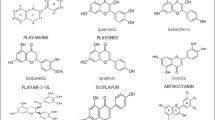Abstract
Objective
To evaluate the apoptosis and cycle arrest effects of Oldenlandia diffusa flavonoids on human gastric cancer cells, determine the action mechanisms in association with the mitochondrial dependent signal transduction pathway that controls production of reactive oxygen species (ROS), and evaluate the pharmacodynamics of a mouse xenotransplantation model to provide a reference for the use of flavonoids in prevention and treatment of gastric cancer.
Methods
Flavonoids were extracted by an enzymatic-ultrasonic assisted method and purified with D-101 resin. Bioactive components were characterized by high-performance liquid chromatography. Cell lines MKN-45, AGS, and GES-1 were treated with different concentrations of flavonoids (64, 96, 128, 160 µg/mL). The effect of flavonoids on cell viability was evaluated by MTT method, and cell nuclear morphology was observed by Hoechst staining. The apoptosis rate and cell cycle phases were measured by flow cytometry, the production of ROS was detected by laser confocal microscope, the mitochondrial membrane potential (MMP) were observed by fluorescence microscope, and the expression of apoptotic proteins related to activation of mitochondrial pathway were measured by immunoblotting. MKN-45 cells were transplanted into BALB/c nude mice to establish a xenograft tumor model. Hematoxylin and eosin staining was used to reveal the subcutaneous tumor tissue. The tumor volume and tumor weight were measured, the expression levels of proliferation markers proliferating cell nuclear antigen (PCNA) and Ki-67 were detected by immunohistochemistry, and the expression levels of CA72-4 were measured by enzyme linked immunosorbent assay.
Results
Oldenlandia diffusa flavonoids inhibited proliferation of MKN-45 and AGS human gastric cancer cells, arrested the cell cycle in G1/S phase, induced accumulation of ROS in the process of apoptosis, and altered MMP. In addition, flavonoids increased Apaf-1, Cleaved-Caspase-3, and Bax, and decreased Cyclin A, Cdk2, Bcl-2, Pro-Caspase-9, and Mitochondrial Cytochrome C (P<0.05). The MKN-45 cell mouse xenotransplantation model further clarified the growth inhibitory effect of flavonoids towards tumors. The expression levels of PCNA and Ki-67 decreased in each flavonoid dose group, the expression level of CA72-4 decreased (P<0.05).
Conclusion
Flavonoids derived from Oldenlandia diffusa can inhibit proliferation and induce apoptosis of human gastric cancer cells by activating the mitochondrial controlled signal transduction pathway.
Similar content being viewed by others
References
Machlowska J, Baj J, Sitarz M, Maciejewski R, Sitarz R. Gastric cancer: epidemiology, risk factors, classification, genomic characteristics and treatment strategies. Int J Mol Sci 2020;21:4012.
Ferlay J, Shin HR, Bray F, Forman D, Mathers C, Parkin DM. Estimates of worldwide burden of cancer in 2008: GLOBOCAN 2008. Int J Cancer 2010;127:2893–2917.
Slagter AE, Vollebergh MA, Jansen EPM, Sandick JW, Cats A, Grieken NCT, et al. Towards personalization in the curative treatment of gastric cancer. Front Oncol 2020;10:614907.
Wagner AD, Syn NL, Moehler M, Grothe W, Yong WP, Tai BC, et al. Chemotherapy for advanced gastric cancer. Cochrane Database Syst Rev 2017;8:CD004064.
Huang WJ, Ruan S, Wen F, Lu XN, Gu SP, Chen XX, et al. Multidrug resistance of gastric cancer: the mechanisms and chinese medicine reversal agents. Cancer Manag Res 2020;12:12385–12394.
Cheng YY, Hsieh CH, Tsai TH. Concurrent administration of anticancer chemotherapy drug and herbal medicine on the perspective of pharmacokinetics. J Food Drug Anal 2018;26:S88–S95.
Chen R, He JY, Tong XL, Tang L, Liu MH. The Hedyotis diffusa Willd. (Rubiaceae): a review on phytochemistry, pharmacology, quality control and pharmacokinetics. Molecules 2016;21:710.
Hu CJ, He J, Li GZ, Fang PP, Xie JD, Ding YW, et al. Analyzing Hedyotis diffusa mechanisms of action from the genomics perspective. Comput Methods Programs Biomed 2019;174:1–8.
Huo JY, Lu Y, Jiao YK, Chen DF. Structural characterization and anticomplement activity of an acidic polysaccharide from Hedyotis diffusa. Int J Biol Macromol 2020;155:1553–1560.
Zhang Y, Xie RF, Xiao QG, Li R, Shen XL, Zhu XG. Hedyotis diffusa Willd extract inhibits the growth of human glioblastoma cells by inducing mitochondrial apoptosis via AKT/ERK pathways. J Ethnopharmacol 2014;158:404–411.
Hu EP, Wang DG, Chen JY, Tao XL. Novel cyclotides from Hedyotis diffusa induce apoptosis and inhibit proliferation and migration of prostate cancer cells. Int J Clin Exp Med 2015;8:4059–4065.
Zhang PY, Zhang B, Gu J, Hao L, Hu FF, Han CH. The study of the effect of Hedyotis diffusa on the proliferation and the apoptosis of the cervical tumor in nude mouse model. Cell Biochem Biophys 2015;72:783–789.
Li YL, Zhang JL, Min D, Zhou HY, Lin N, Li QS. Anticancer effects of 1,3-dihydroxy-2-methylanthraquinone and the ethyl acetate fraction of Hedyotis Diffusa Willd against HepG2 carcinoma cells mediated via apoptosis. PLoS One 2016;11:e0151502.
Lin LY, Cheng KL, Xie ZQ, Chen CY, Chen L, Huang YD, et al. Purification and characterization a polysaccharide from Hedyotis diffusa and its apoptosis inducing activity toward human lung cancer cell line A549. Int J Biol Macromol 2019;122:64–71.
Wang QL, Xue YJ, Han T. Extraction of flavone in Hedyotis diffusa Wild and its effect on gastric cancer cell BGC-823 in proliferation cycle and apoptosis. Chin J Integr Tradit West Med Dig (Chin) 2015;23:760–763.
Liang HN, Liu QB, Ling JY, Lin L, Liu JN, Wang X, et al. Extraction of flavonoids from Oldenlandia diffusa by enzymatic-ultrasonic assisted method. Chin Pharm J (Chin) 2021;56:1041–1047.
Wang X, Xia SL, Liu JN, Ling JY, Wang QL, Lin L, et al. Study on purification process of total flavonoids from Oldenlandia diffusa by macroporous resin and its tumor inhibition in vivo. Inf Tradit Chin Med (Chin) 2021;38:16–21.
Li M, Zhang HY, Shao HO. Effects of total flavonoids of Oldenlandia diffusa on immunity and antioxidant capacity of cervical cancer U14 bearing mice. J Chin Med Mater (Chin) 2019;42:1417–1420.
Wang X, Ling JY, Zhai YC, Xia SL, Wang QL, Han T. Effects of total flavonoids of Oldenlandia diffusa on serum tumor markers and immune function of MFC gastric cancer bearing mice. Chin J Clin Pharmacol (Chin) 2021;37:2627–2630.
Ruth SS, Elazar Z. Regulation of autophagy by ROS: physiology and pathology. Trends Biochem Sci 2011;36:30–38.
Sosa V, Moliné T, Somoza R, Paciucci R, Kondoh H, LLeonart ME. Oxidative stress and cancer: an overview. Ageing Res Rev 2013;12:376–390.
Li ZY, Yang Y, Ming M, Liu B. Mitochondrial ROS generation for regulation of autophagic pathways in cancer. Biochem Biophys Res Commun 2011;414:5–8.
Kuczler MD, Olseen AM, Pienta KJ, Amend SR. ROS-induced cell cycle arrest as a mechanism of resistance in polyaneuploid cancer cells (PACCs). Prog Biophys Mol Biol 2021;165:3–7.
Hwang CY, Lee SM, Park SS, Kwon KS. CDK2 differentially controls normal cell senescence and cancer cell proliferation upon exposure to reactive oxygen species. Biochem Biophys Res Commun 2012;425:94–99.
Mansilla SF, Vega MB, Calzetta NL, Siri SO, Gottifredi V. CDK-independent and PCNA-dependent functions of p21 in DNA replication. Genes (Basel) 2020;11:593.
Zambon AC. Use of the Ki67 promoter to label cell cycle entry in living cells. Cytometry A 2010;77:564–570.
Wang J, Deng HY, Zhang JX, Wu DD, Li J, Ma JJ, et al. α-Hederin induces the apoptosis of gastric cancer cells accompanied by glutathione decrement and reactive oxygen species generation via activating mitochondrial dependent pathway. Phytother Res 2020;34:601–611.
Author information
Authors and Affiliations
Contributions
Wang QL designed the study and guided the revision of the manuscript. Ling JY completed most of the experimental projects and wrote the manuscript. Yin DH assisted Ling JY in animal feeding and provided technical guidance for animal experiments. Lin L instructed Liang HN and Liu QB regarding flavonoid extraction. All authors read and approved the final version.
Corresponding author
Ethics declarations
The authors declare no conflict of interest.
Additional information
Supported by the Key Research and Development Program of Gansu Province (No. 21YF5FA131), the Innovation Fund of Gansu Universities (No. 2021A-084), and the Graduate Innovation Fund of Gansu University of Chinese Medicine (No. 2021CX49)
Supplementary material to
11655_2022_3679_MOESM1_ESM.pdf
Flavonoid-rich Extract of Oldenlandia diffusa (Willd.) Roxb. Inhibits Gastric Cancer by Activation of Caspase-dependent Mitochondrial Apoptosis
Rights and permissions
About this article
Cite this article
Ling, Jy., Wang, Ql., Liang, Hn. et al. Flavonoid-Rich Extract of Oldenlandia diffusa (Willd.) Roxb. Inhibits Gastric Cancer by Activation of Caspase-Dependent Mitochondrial Apoptosis. Chin. J. Integr. Med. 29, 213–223 (2023). https://doi.org/10.1007/s11655-022-3679-4
Accepted:
Published:
Issue Date:
DOI: https://doi.org/10.1007/s11655-022-3679-4




